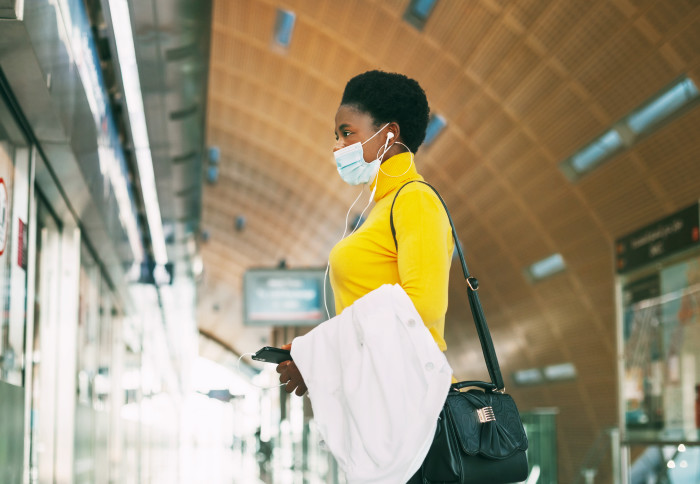#MeToo: More women report feeling unsafe on public transport since movement

Women are 2.5% more likely to report feeling unsafe on public transport since #MeToo highlighted women’s experiences of harassment.
This is according to a study looking at 137,531 customer surveys for public transport users in 25 metro systems worldwide.
Our work highlights (#MeToo's) effect on women’s motivation to speak up and suggests that public discourse invites further reporting of feeling unsafe. Dr Laila AitBihiOuali Department of Civil and Environmental Engineering
As well as being more likely to report feeling unsafe in both stations and metro carriages after the 2017 #MeToo movement highlighted people’s experiences of sexual assault and harassment, women were 2.1% more likely than men to state that they are not satisfied overall with metro systems following the movement.
These feelings were more prevalent in women who commuted daily using public transport, and were not accompanied by an increase in reporting of crimes on public transport.
The Imperial College London authors of the study, published in Transportation Research Part A, say this highlights the effect of wider social context on the motivation to report true feelings, and demonstrates that so-called ‘informational shock’ can alter perceptions of what is ‘normal’ and cause people to feel differently as those perceptions shift. It also adds to their earlier research which found that women are 10% more likely than men to report feeling unsafe on city public transport.
In opening a new debate and leading to more articles on the topic, the movement changed the behaviours and feelings women perceived to be normal. Dr Laila AitBihiOuali Department of Civil and Environmental Engineering
Previous studies have found that women tend to underreport bad experiences, like harassment, on public transport. Lead author Dr Laila AitBihiOuali, of Imperial’s Department of Civil and Environmental Engineering, said: “The #MeToo movement was momentous in sparking conversations about women’s experiences of society in general. Our work highlights its effect on women’s motivation to speak up and suggests that public discourse invites further reporting of feeling unsafe.
“Our results suggest that, in opening a new debate and leading to more articles on the topic, the movement changed the behaviours and feelings women perceived to be normal.”
#MeToo
Since its beginning on 15 October 2017, the #MeToo movement has encouraged women to reveal experiences of harassment. This began in the USA but press coverage spread worldwide and sparked wider debates around women’s security, including in European countries.
To study the effect of #MeToo on the reporting of feelings of safety on public transport, the researchers used annually collected data from 2014 to 2018 via responses to existing Customer Satisfaction Surveys (CSS).
Public transport operators send online CSSs to passengers every year that are designed to measure general feelings of satisfaction with their networks. The surveys ask passengers their level of agreement with various statements about availability, time, information, comfort, security, customer care, accessibility, environment, and overall satisfaction.
Although we know that women already feel 10% less safe than men on public transport, this work highlights the effect of social context on letting women speak up and challenge the norm. Dr Laila AitBihiOuali Department of Civil and Environmental Engineering
The researchers looked at 137,531 completed responses to CSSs worldwide from 2014 to 2018 and measured reported feelings of safety before and after #MeToo in both men and women.
They found that following #MeToo, women were 2.5% more likely to report feeling unsafe than pre-#MeToo levels.
Dr AitBihiOuali studies gender gaps in the perception of safety to analyse barriers faced by women in urban areas like big cities with metros and bus networks. She said: “#MeToo represented an informational shock and, although we know that women already feel 10% less safe than men on public transport, this work highlights the effect of social context on letting women speak up and challenge the norm.
”Although a 2.5% increase might seem small at first, it is statistically significant, which is a key contribution of this work. This study provides the precise measurement of the causal impact of #MeToo on individuals' travel perceptions – which is all the more important considering that #MeToo is a phenomenon which is not rooted initially in transport issues.
“Moreover, most studies on the topics of gender and transport essentially highlight correlations, whereas our study uses models that let us pinpoint the precise causation of #MeToo on perceptions. This effect is cleared of factors like time trends, local effects, and the composition of the sample.”
The authors say the work will lead to longer-term analyses of the effect of social movements on perceptions of safety. Dr AitBihiOuali said: “We collect annual data for the same cities, so it would be interesting to assess whether this change in responses is lasting. Although the COVID-19 pandemic has brought the whole world to a halt, this could constitute a very important long-term project to see whether this uptick in reporting of feelings of safety is transient or permanent, and what the effects on women’s wellbeing might be.”
“The impact of the MeToo Scandal on women’s 2 perceptions of safety” by Laila AitBihiOuali and Daniel Graham published in Transportation Research Part A.
Image: Shutterstock
Article text (excluding photos or graphics) © Imperial College London.
Photos and graphics subject to third party copyright used with permission or © Imperial College London.
Reporter
Caroline Brogan
Communications Division